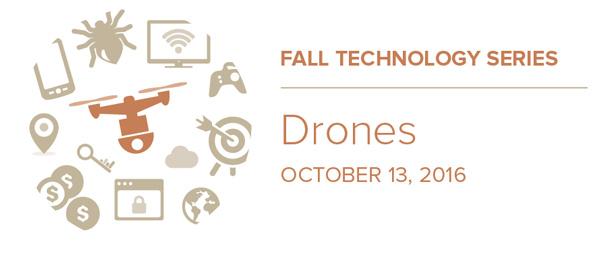Constitution Center
400 7th St SW
Washington
DC
20024
Event Description
Americans are increasingly familiar with drones, also known as Unmanned Aerial Systems (UAS). These devices have become one of consumers’ most popular technology purchases; some estimate nearly one million new drones will be purchased in 2016. Many consumer drones are controlled by tablet or smartphone, and feature high-definition cameras, GPS, and the ability to fly autonomously. Commercially available drones are even more sophisticated, and are increasingly used for a variety of activities, including monitoring and inspection, news reporting, search and rescue of missing persons, and delivery of commercial packages or medicine to rural areas. With potential to transform entire industries, the devices may generate significant economic benefits. Although drones may offer society numerous benefits, the potential for information collection through filming, photography or other types of monitoring raises the potential for consumer harms including invasion of privacy, identification, trespass, and harassment. The National Telecommunications and Information Administration (NTIA) recently convened multi-stakeholder meetings to develop and communicate best practices for privacy, accountability, and transparency issues regarding commercial and private drone use. The drones workshop will explore the following questions related to commercial uses of drones:
What are the present capabilities of drone technologies?
- What technology do we foresee in the near future? In the longer term?
- What privacy concerns do drones raise?
- Are these concerns unique to drones, or are drones no different from other technologies?
For people whose information may be captured by drones, what is the best way to provide transparency?
- Given the difficulties of providing consumers with meaningful choices, what should the rules around privacy look like?
- Should there be limits on data collection or limits on use?
Video from the Workshop
- Opening Remarks, Presentation by FTC Office of Technology Research & Technology, Panel 1: Do Drones Raise Unique Privacy Concerns?
- Consumer Perceptions of Drones, Panel 2: How Should Privacy Concerns Be Addressed?
FTC staff also live-tweeted from the workshop @FTC using the hashtag #DronesFTC.
-
12:00 pm
Registration
1:00 pm
Introductory Remarks
Jamie Hine
Senior Attorney, Division of Privacy and Identity Protection, Federal Trade CommissionOpening Remarks
Maureen Ohlhausen
Commissioner, Federal Trade Commission1:15 pm Presentation by Office of Technology Research & Investigation
Joseph Calandrino
Phoebe Rouge
Chrysm Watson-Ross
Office of Technology Research & Investigation, Federal Trade Commission1:30 pm
Panel 1: Do Drones Raise Unique Privacy Concerns?
- What are the present capabilities of drone technologies?
- What technology do we foresee in the near future? In the longer term?
- What privacy concerns do drones raise?
- Are these concerns unique to drones, or are drones no different from other technologies?
Moderator:
Jamie Hine/Kate White
Federal Trade CommissionPanelists:
- Gregory McNeal
Professor of Law and Public Policy, Pepperdine University School of Law Co-Founder, AirMap - Jeramie D. Scott
Director, EPIC Domestic Surveillance Project - Brendan Schulman
Vice President of Policy & Legal Affairs, DJI - Kara Calvert
Director, Drone Manufacturers Alliance
2:40 pm
Break
3:00 pm
Presentation: Consumer Perceptions of Drones Yang Wang
Assistant Professor, School of Information Studies, Syracuse University3:20 pm Panel 2: How Should Privacy Concerns Raised By Drones Be Addressed?
- For people whose information may be captured by drones, what is the best way to provide transparency?
- Given the difficulties of providing consumers with meaningful choices, what should the rules around privacy look like?
- Should there be limits on data collection or limits on use?
Moderator:
Jamie Hine/Kate White
Federal Trade Commission
Panelists:- Margot E. Kaminski
Assistant Professor of Law, Moritz College of Law, The Ohio State University - Dr. Jeremy Gillula
Senior Staff Technologist, Electronic Frontier Foundation - Diana Cooper
Vice President of Legal and Policy Affairs, PrecisionHawk - Mark Aitken
Director of Government Relations, AUVSI - Michael Drobac
Small UAV Coalition, AKIN GUMP STRAUSS HAUER & FELD LLP - Kristine Gloria
Privacy Research Fellow, Startup Policy Lab
FileAgenda (123.18 KB)
-
Location

